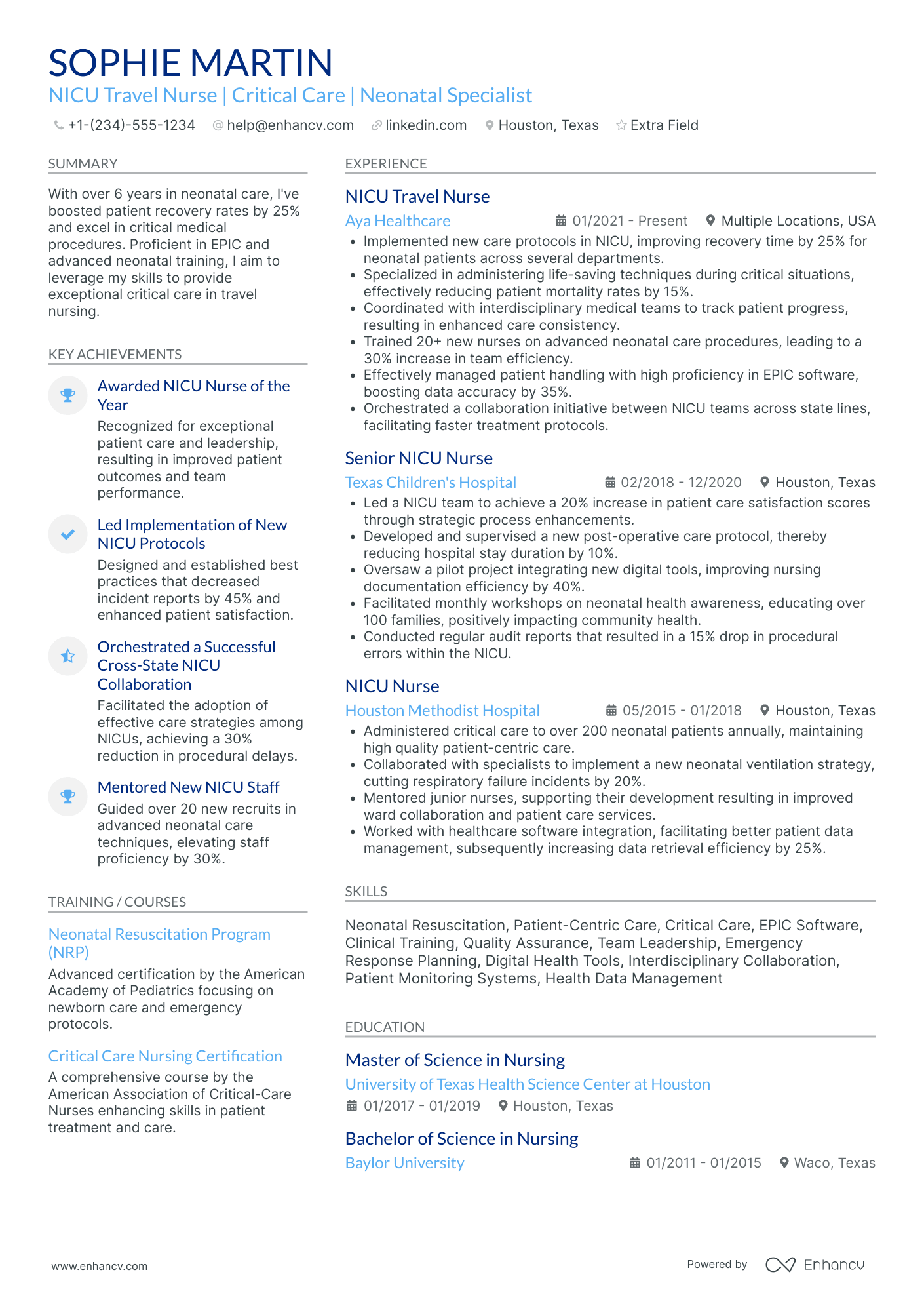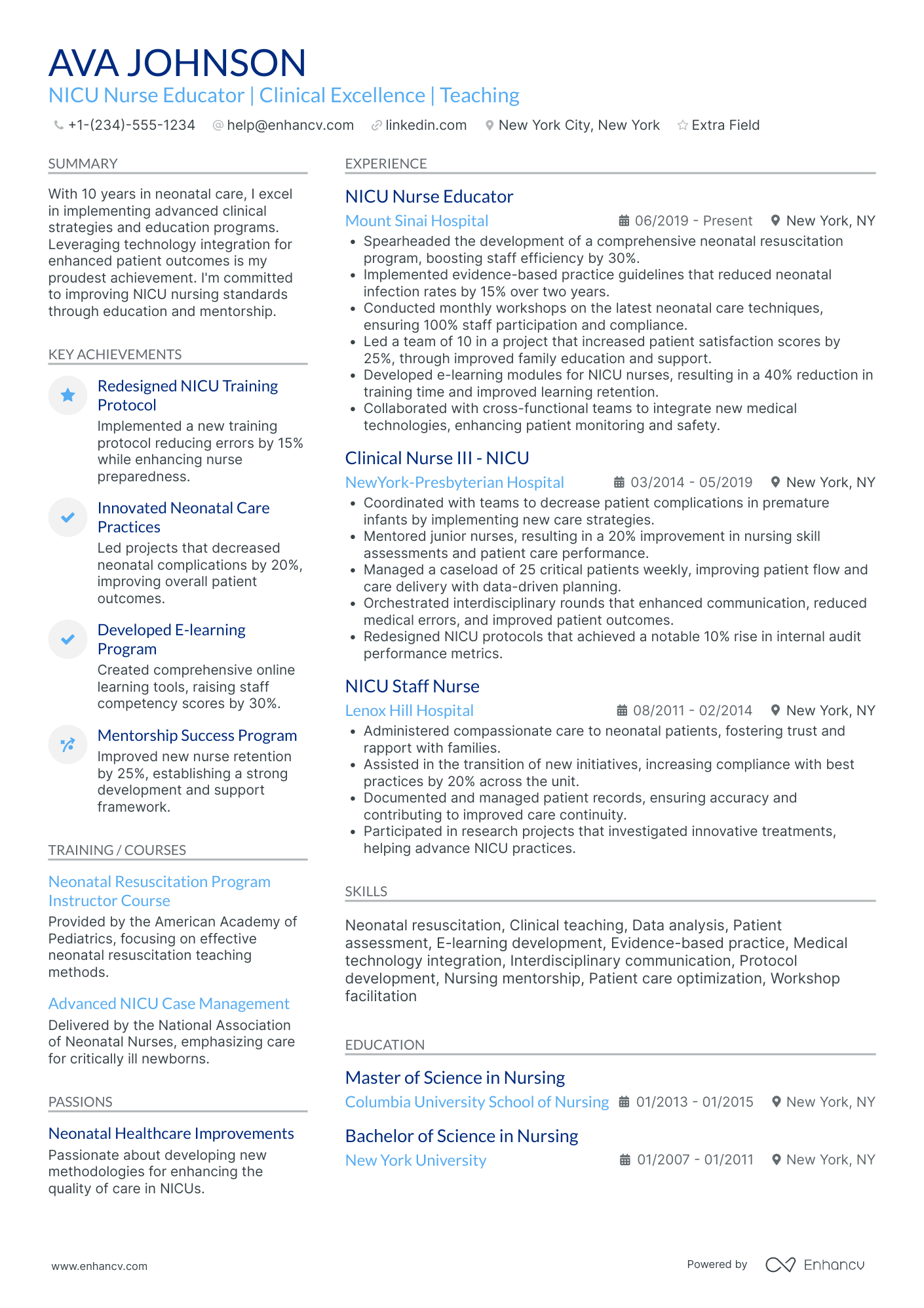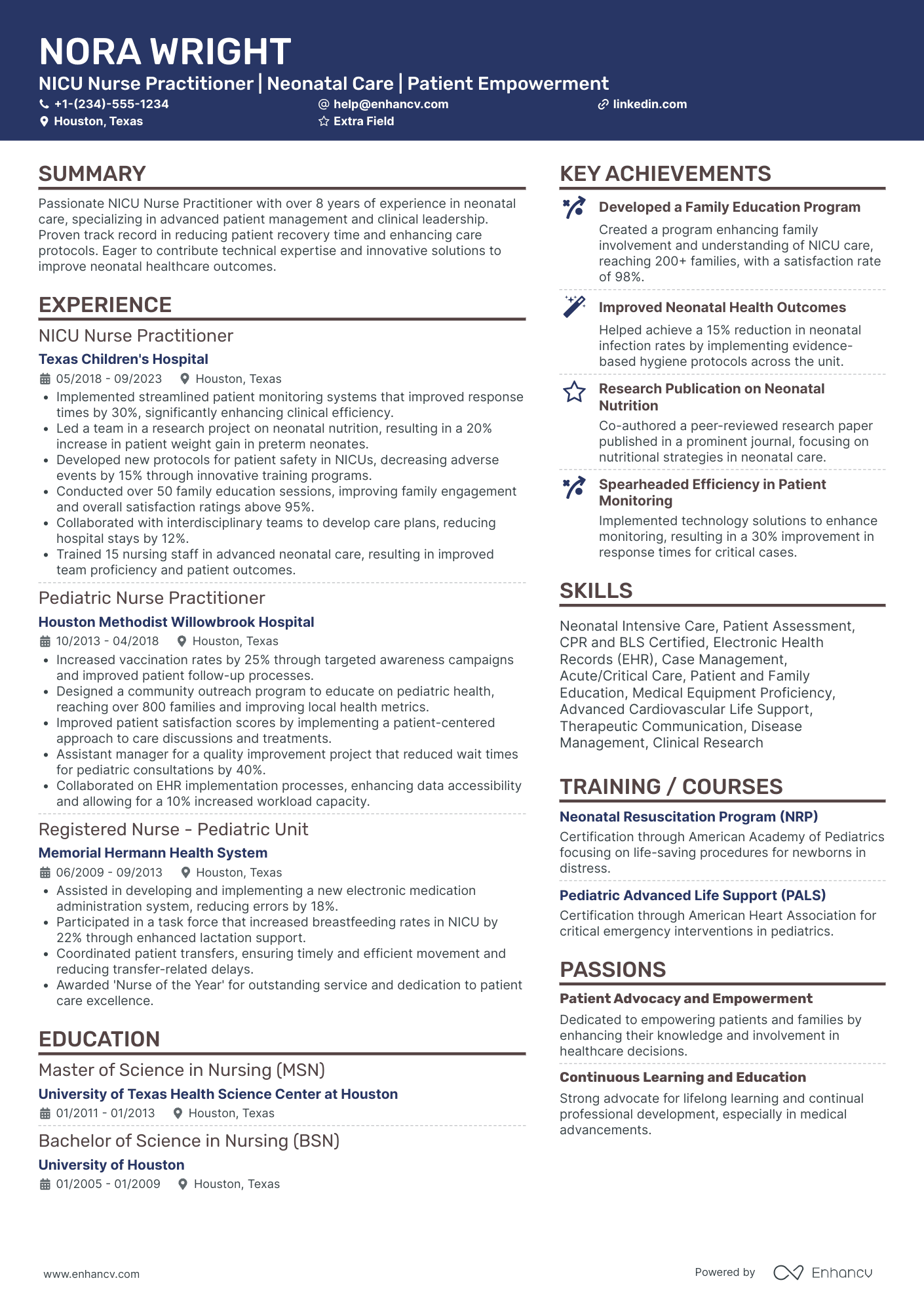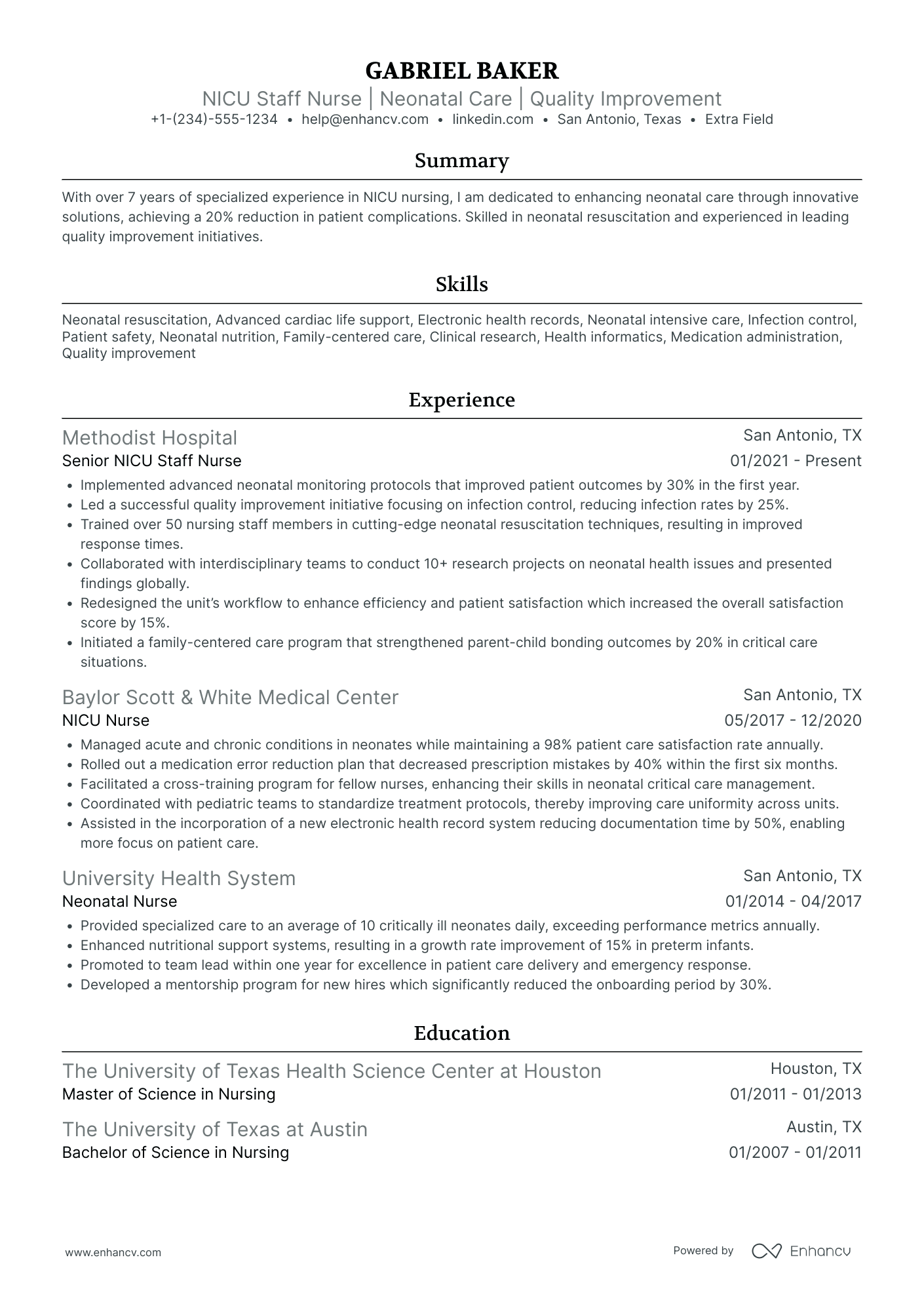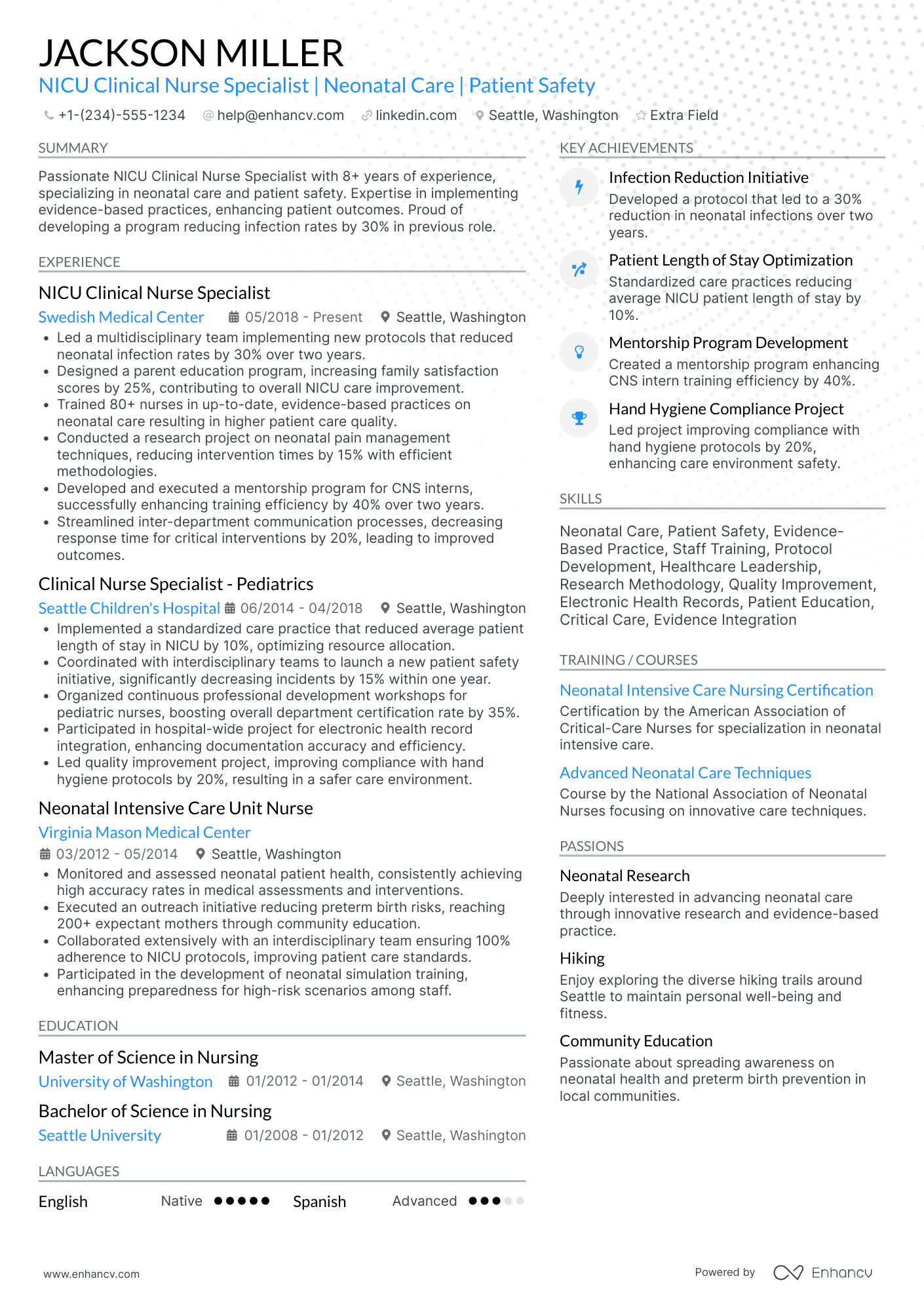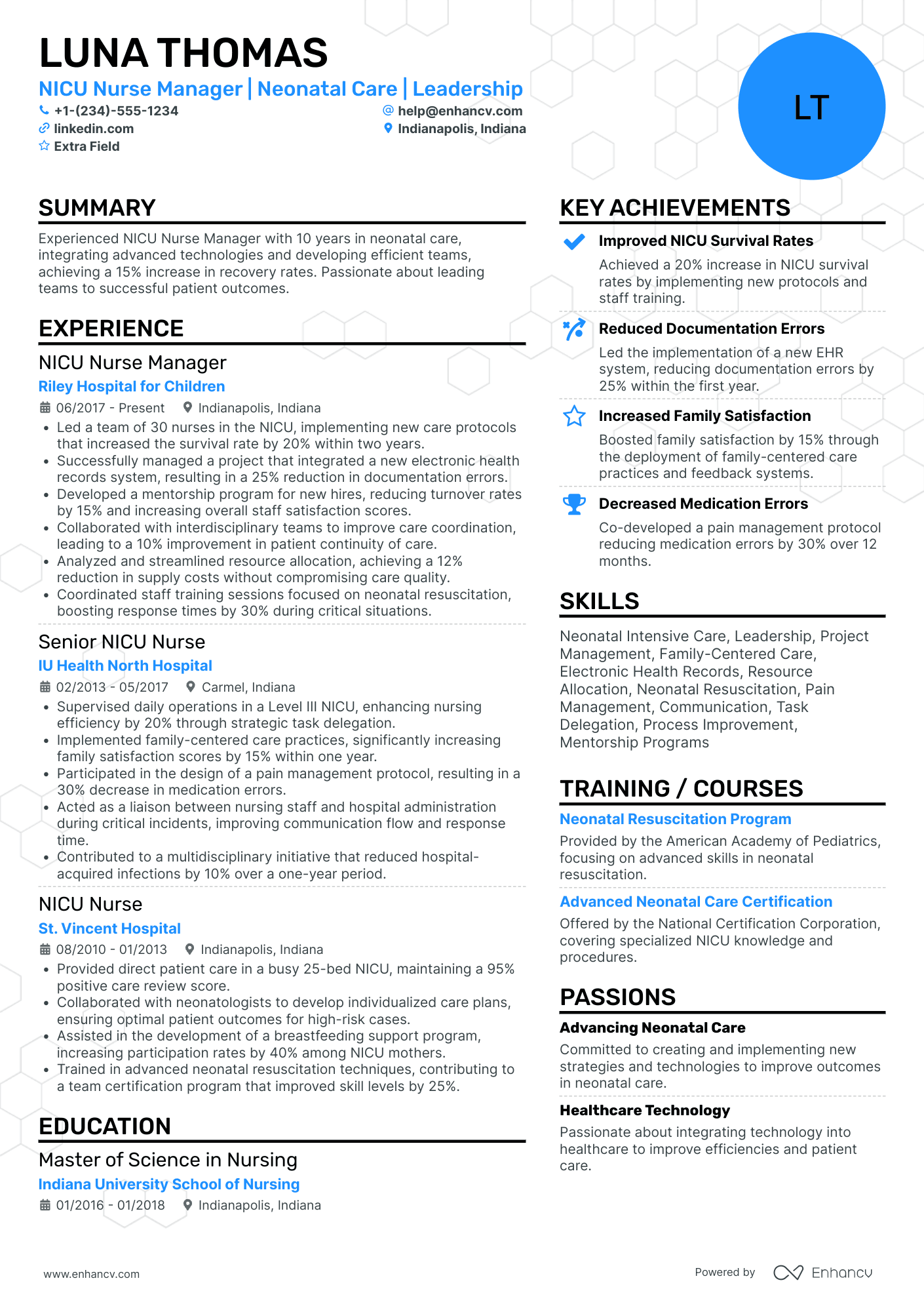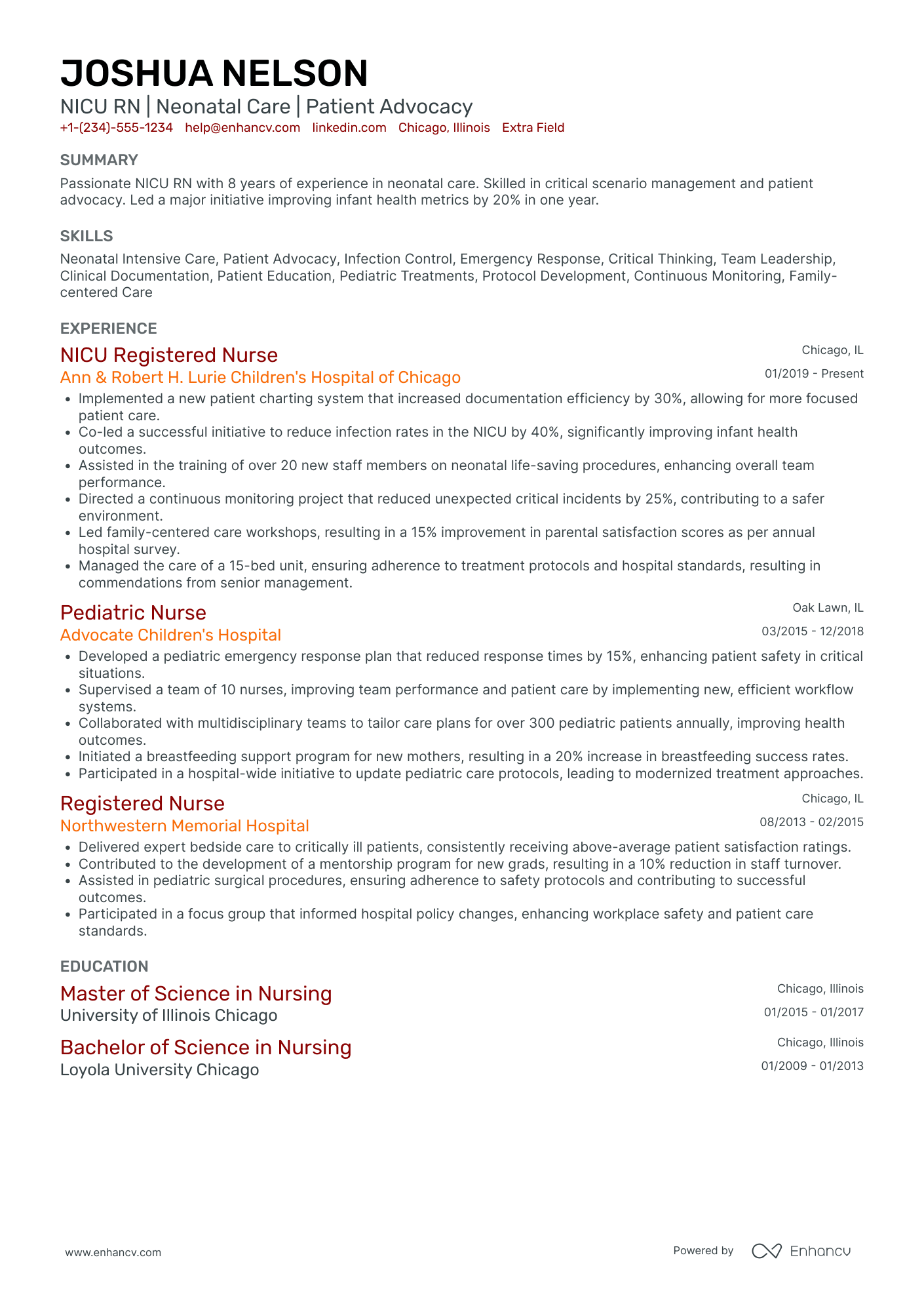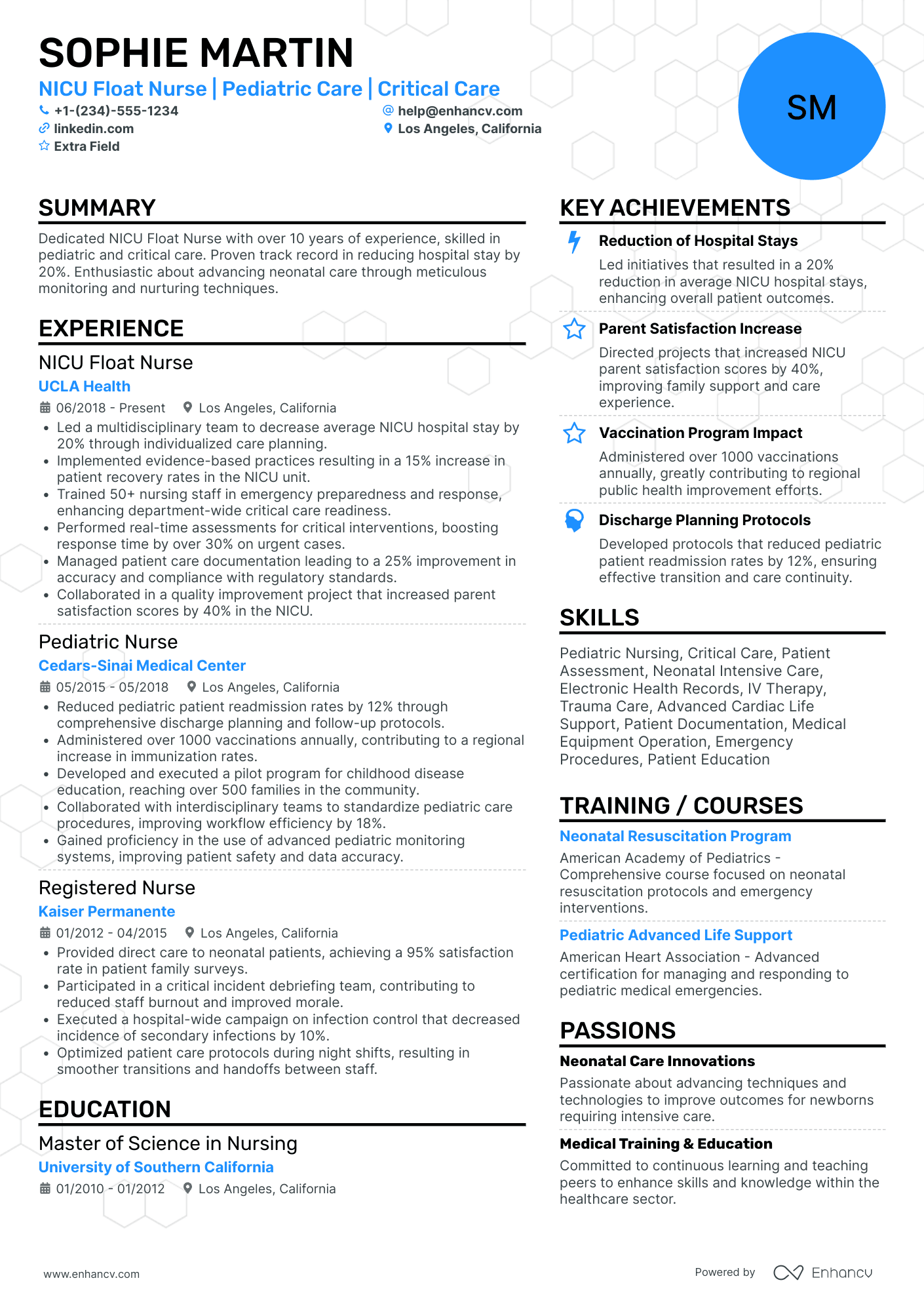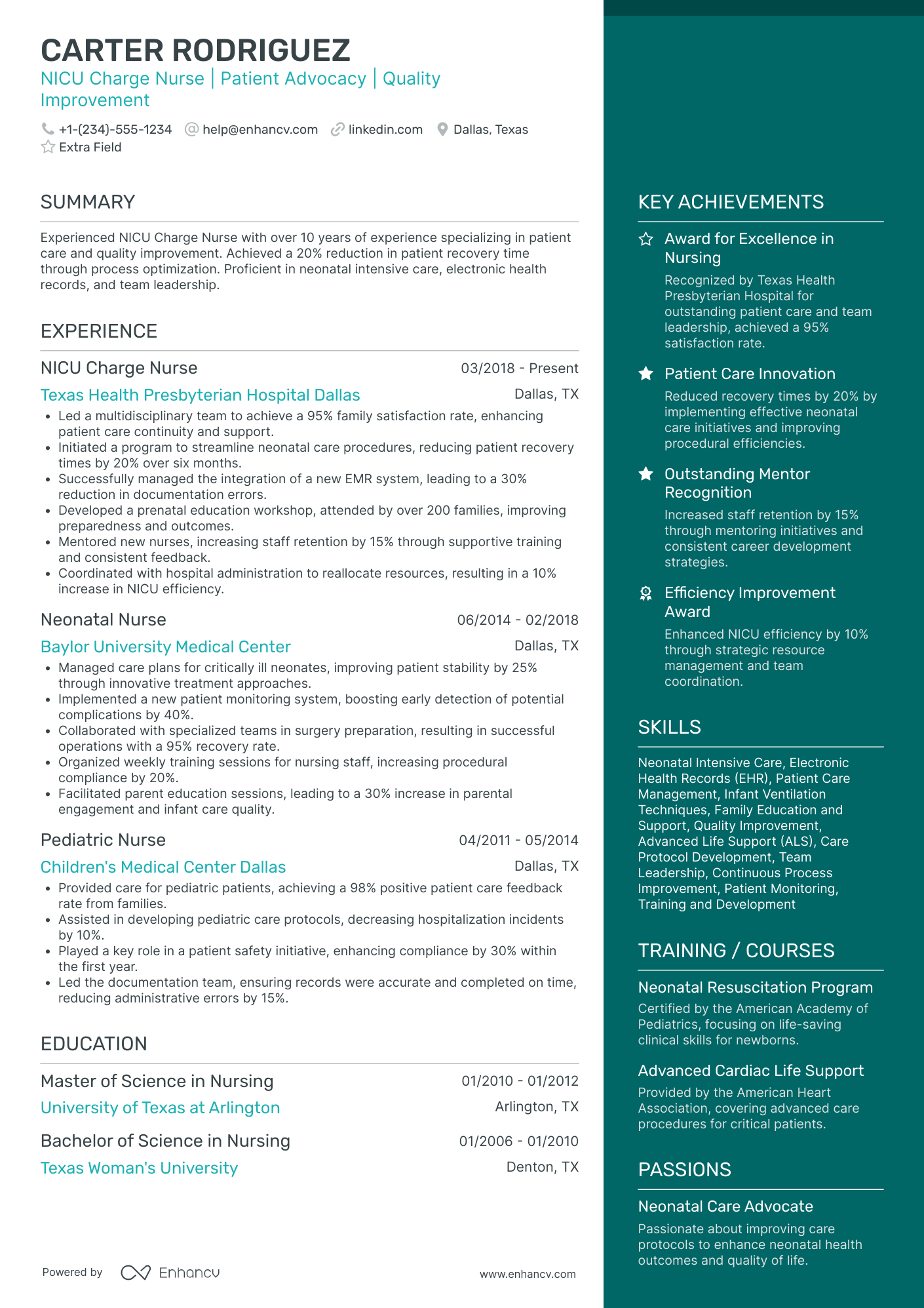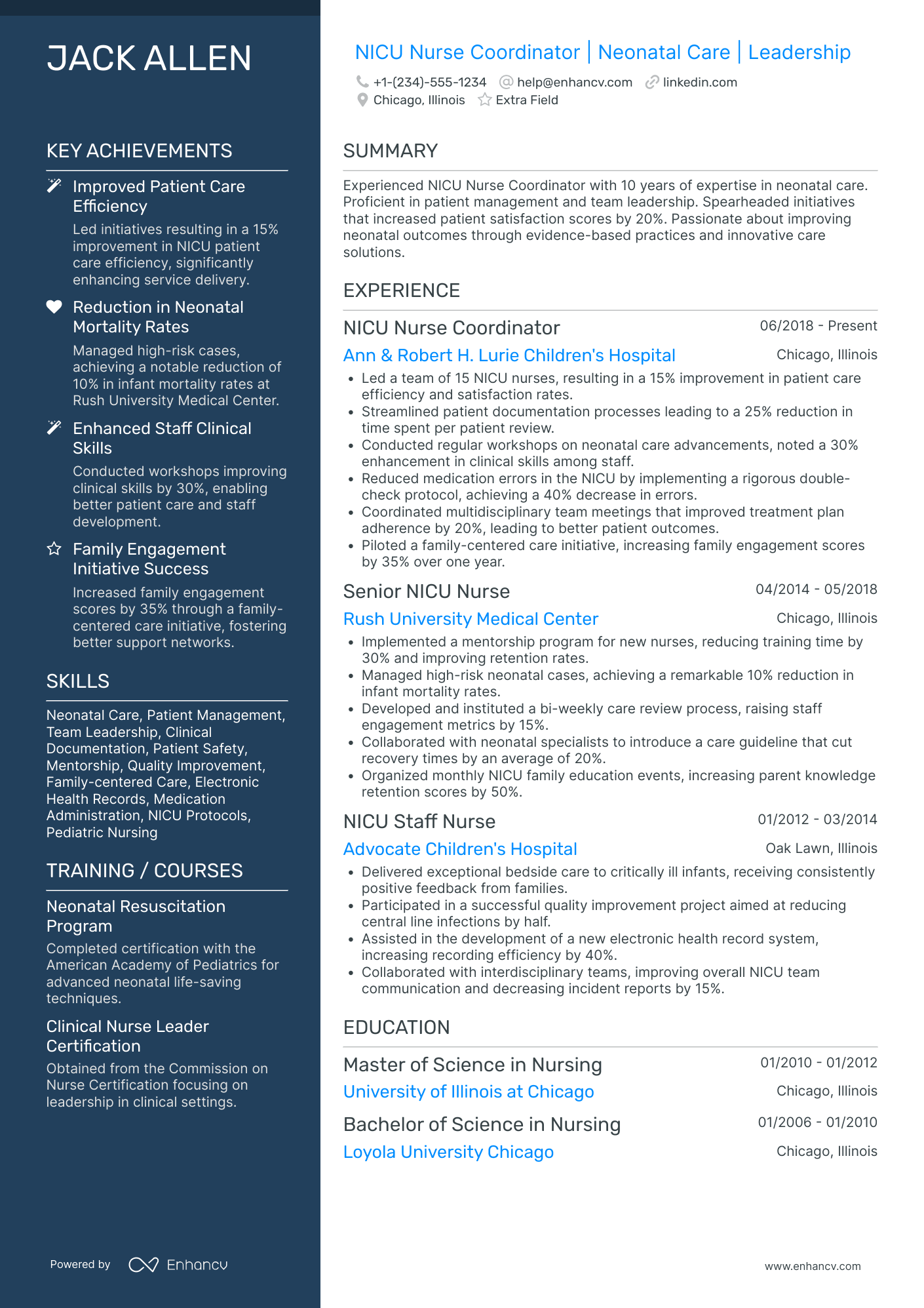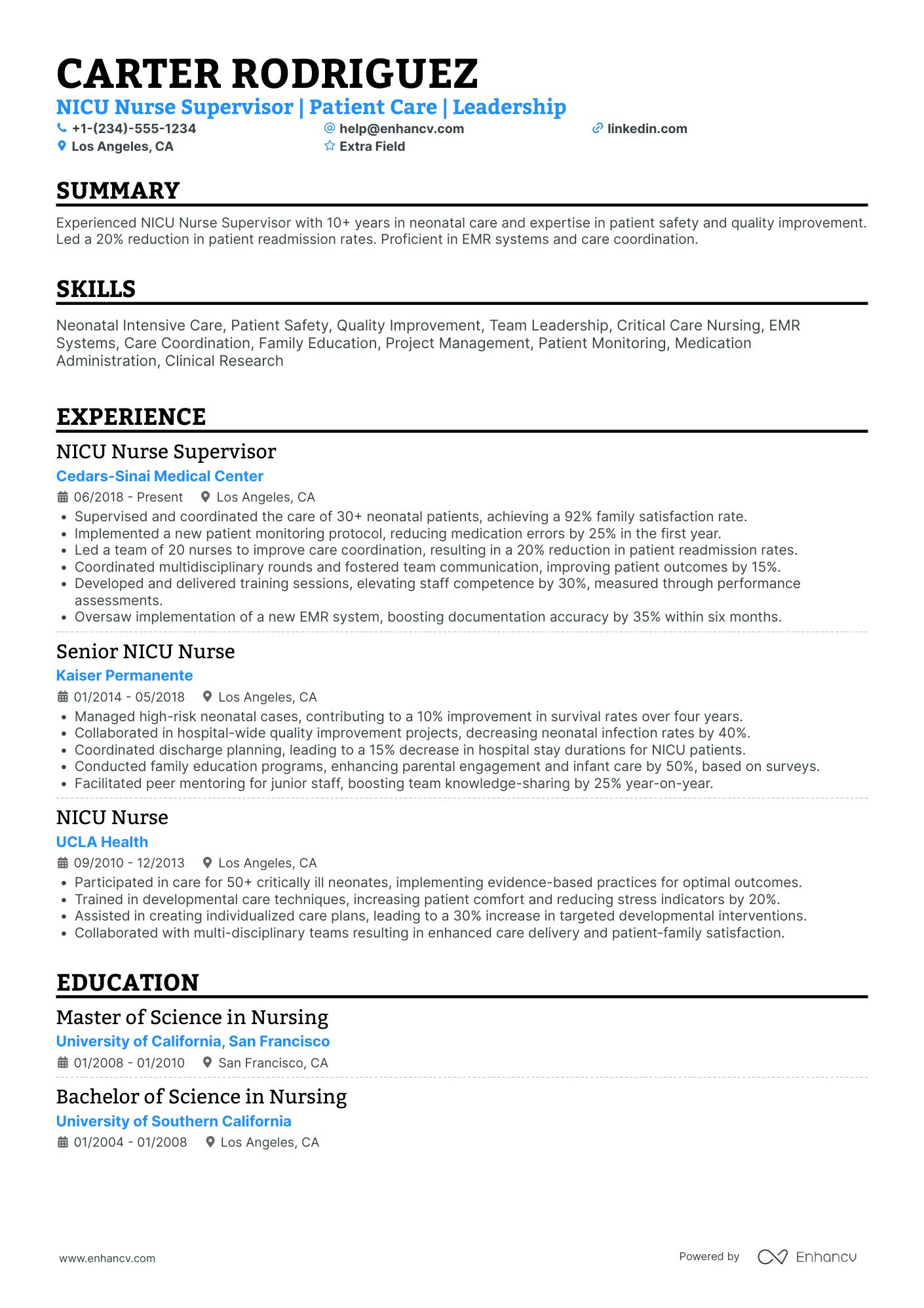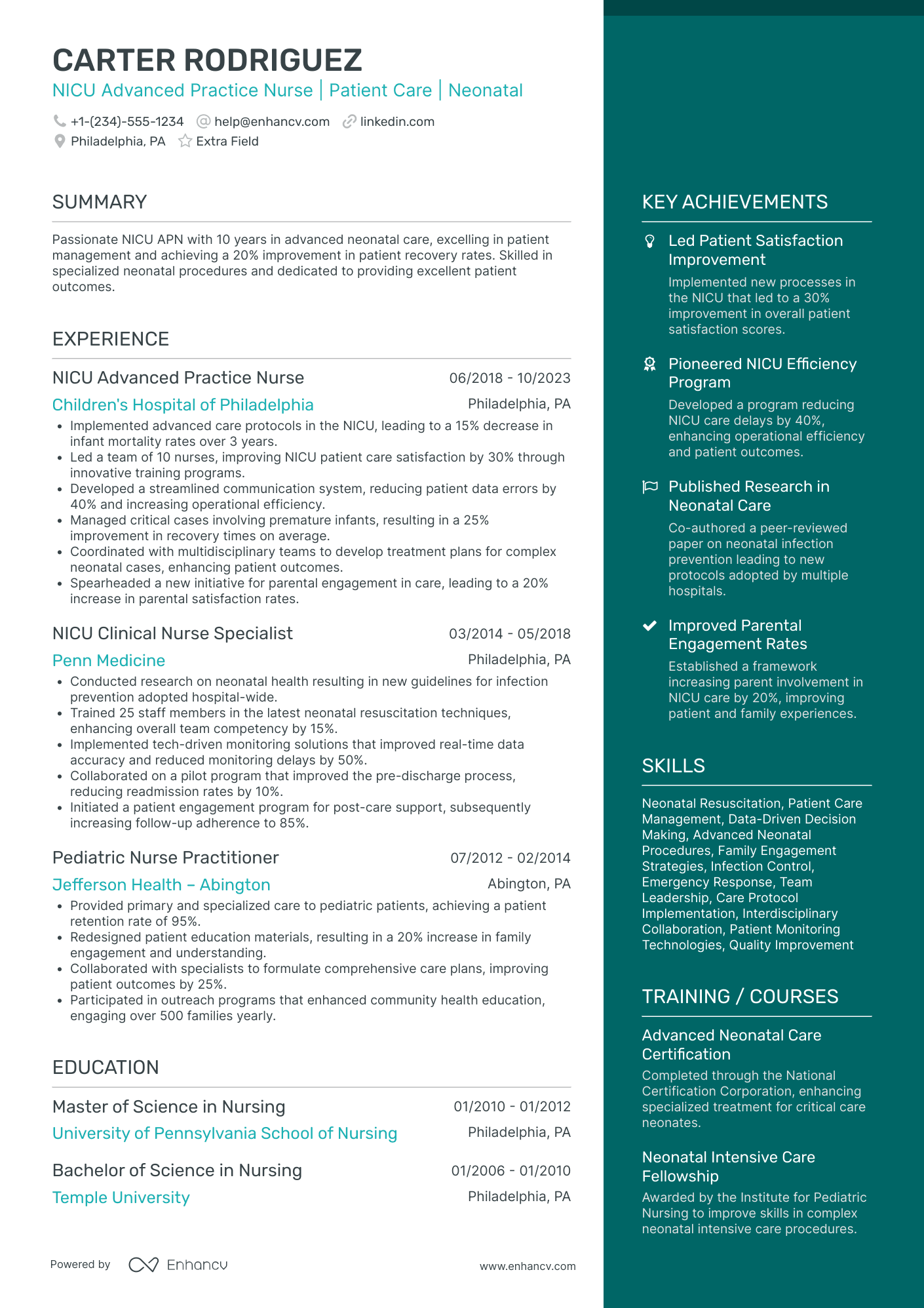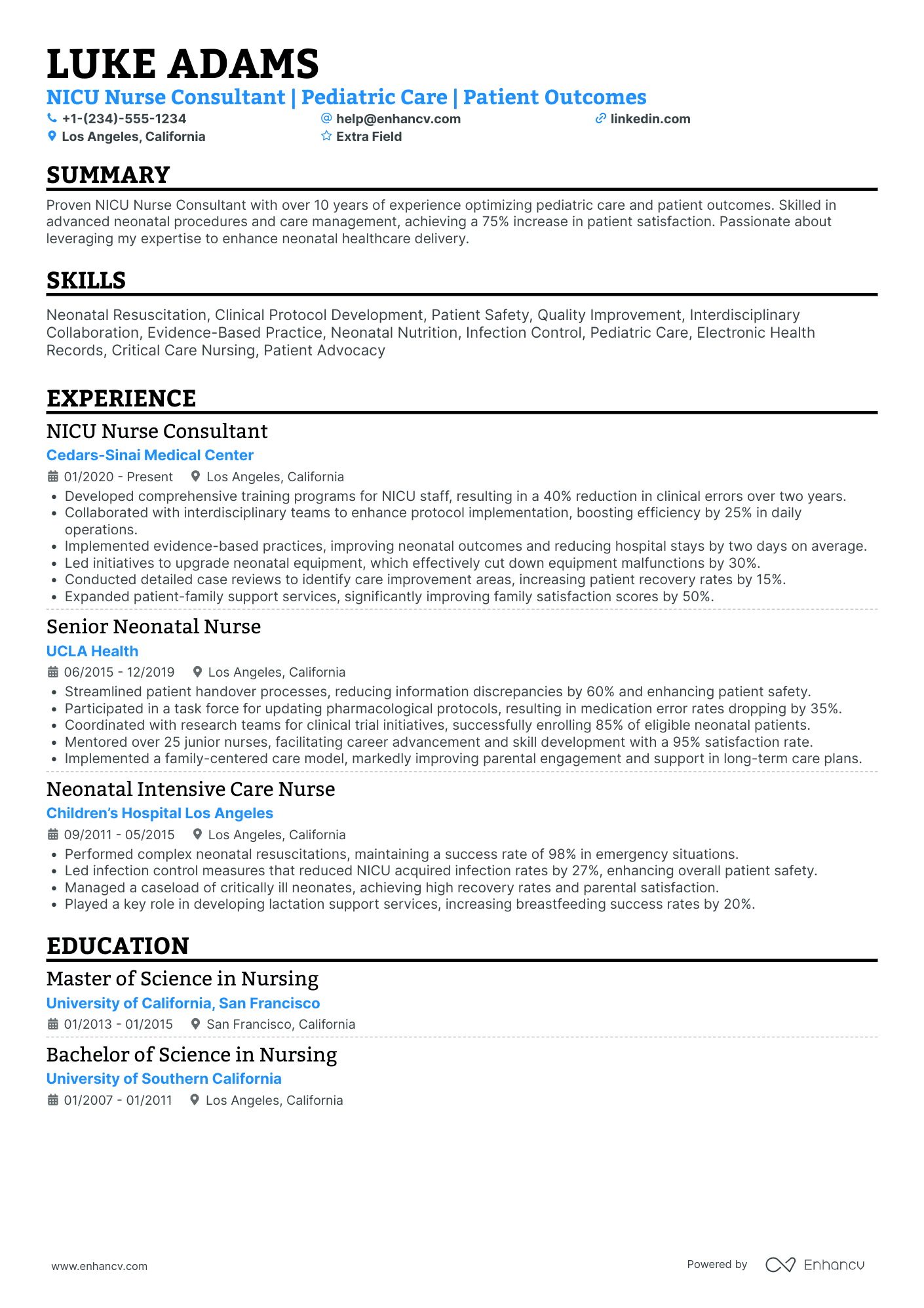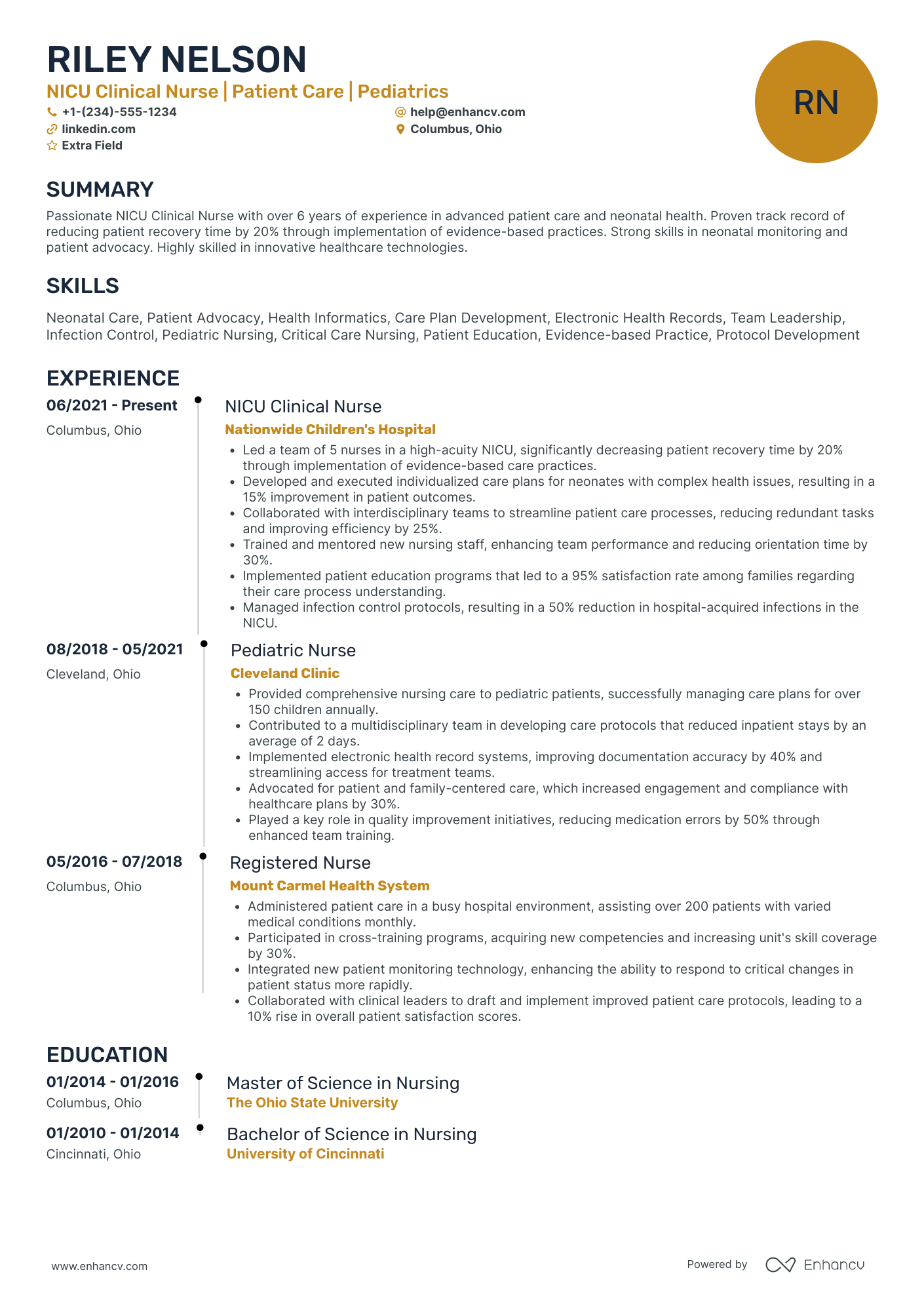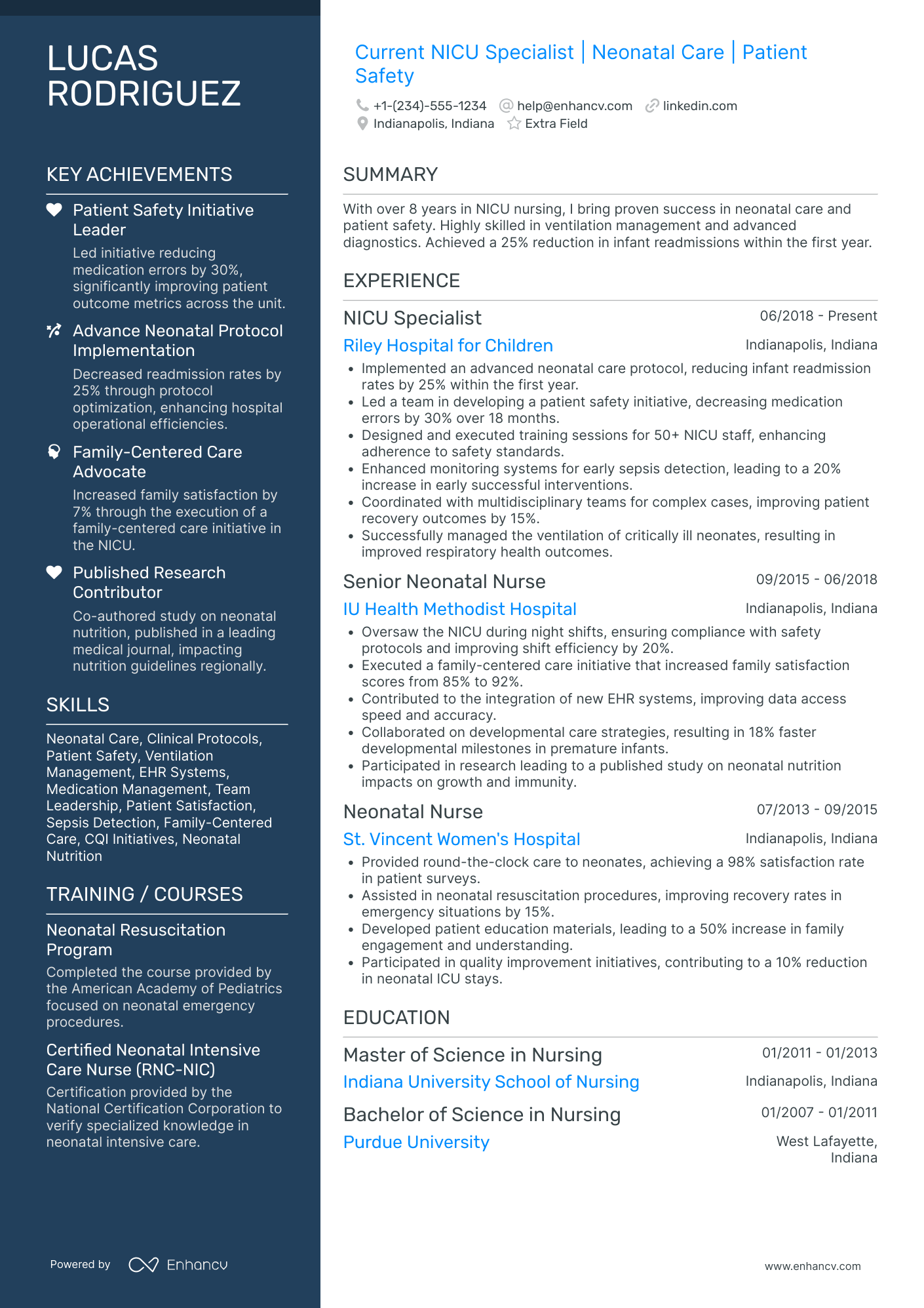Embarking on a journey as a NICU nurse isn’t just a career choice; it's a calling to make a monumental difference in the lives of the smallest and most vulnerable patients. With over 10% of U.S. newborns requiring NICU care each year, the demand for skilled neonatal nurses is more pressing than ever.
Crafting a resume for such a noble position goes beyond listing qualifications—it's about showcasing your compassion, expertise, and unwavering dedication to neonatal care. In this guide, we'll walk you through tailoring your resume to highlight the heart and skill required to thrive in a NICU setting.
Below are some other nurse-related guides if you think they’ll be more relevant to your situation:
- School Nurse Resume Guide
- PACU Nurse Resume Guide
- Clinical Nurse Resume Guide
- Pediatric Nurse Resume Guide
- Clinical Research Nurse Guide
- NICU nurse Cover Letter
If you don’t see the position you’re looking for, just visit our main Resume Guide page and do a search. Now, let’s craft a resume.
Over 90% of NICU nurses report that the emotional connection formed with both the neonates in their care and the families is the most rewarding part of their job, highlighting the profound impact of their work beyond the clinical aspects.
How to format a NICU nurse resume
When crafting a resume for a NICU nurse position, choosing the right format is crucial to highlight your qualifications, experience, and suitability for the role. Here’s a brief overview of the three most common resume formats:
- Reverse chronological order: This format lists your work experience starting from the most recent and working backwards. It's best for candidates with solid and continuous work history, allowing them to showcase their progression in the neonatal nursing field.
- Functional format: Focuses on your skills and qualifications rather than your work history. This format is suitable for new graduates, individuals with gaps in their employment, or those making a career change into NICU nursing, as it allows them to highlight their competencies over job experiences.
- Hybrid or combination: Combines elements of both chronological and functional formats, presenting skills and qualifications upfront followed by a concise employment history. This format is ideal for candidates with relevant skills and some experience, including those with transferable skills from other nursing areas.
Additional formatting tips:
Resume designs
- Keep resume margins between 0.5” and 1” to ensure it’s easy to read.
- Use professional and readable resume fonts like Arial, Rubik, Calibri, or Times New Roman at a size of 10-12 pt.
- Incorporate subtle resume colors for headings if desired, but maintain a majority of the text in black for readability.
- Aim for a resume length of 1-2 pages, depending on your experience and accomplishments.
Contact information (resume header)
- Include your name, phone number, and professional email address in the header.
- Add your LinkedIn profile link if it's up to date.
- Typically, resume photos aren’t recommended on resumes in the U.S. due to anti-discrimination laws.
- The physical address can be limited to city and state for privacy reasons.
ATS compatibility
- Use a simple format and avoid footers and tables that might confuse ATS scanners
- Incorporate keywords from the NICU nurse job description to ensure an ATS-friendly resume.
File formatting, naming convention, etc.
- Save your resume as a PDF to preserve formatting across different devices, unless the job posting specifies otherwise.
- When naming your resume file, use a clear format such as "FirstNameLastNameNICUNurse_Resume" to make it easily identifiable.
Think about the location of your application – Canadian resumes, for instance, might follow a different structure.
Is your resume good enough?
Drop your resume here or choose a file. PDF & DOCX only. Max 2MB file size.
Here are the most important sections on your resume, so pay close attention to each one to achieve the best possible outcome.
The top sections on a NICU nurse resume
- Professional experience: Showcases your hands-on experience in neonatal care, emphasizing your competence in handling the specific needs of newborns in critical condition.
- Certifications: Highlights essential certifications like NRP (Neonatal Resuscitation Program) and RNC-NIC (Certified Neonatal Intensive Care Nurse), proving your specialized knowledge and skills.
- Education: Details your nursing degree and any specialized training relevant to neonatal care, underscoring your foundational knowledge in nursing and specialized education in neonatal care.
- Skills: Lists specific skills such as proficiency in neonatal ventilator management, demonstrating your technical capabilities and readiness to handle complex neonatal care requirements.
- Awards and recognitions: Features any awards or acknowledgments received in the field of neonatal care, underlining your excellence and dedication to the specialty.
The purpose of your resume is to impress the recruiter and convince them that you’re deserving of contact. So our research has shown that the items below are some of the top things that impress most employers looking for a NICU nurse.
What recruiters want to see on your resume
- Clinical skills in neonatal care: Demonstrates expertise in caring for newborns, particularly in intensive care settings.
- Certifications relevant to neonatology: Highlights specialized training such as NRP (Neonatal Resuscitation Program) or CCRN (Certified Critical Care Nurse) which are crucial for this role.
- Experience with neonatal technology: Shows proficiency with medical devices and technology used in neonatal care, essential for monitoring and treating vulnerable infants.
- Understanding of neonatal pharmacology: Essential for administering and understanding medications and their effects on neonates.
- Compassionate communication skills: Critical for providing support and clear communication to families during challenging times.
Now, let’s check out what actually needs to go into your resume starting with perhaps the most essential element—resume work experience.
How to write your NICU nurse resume experience
Listing work experience on a NICU nurse resume is essential to present yourself as a competent, skilled, and dedicated professional who can contribute significantly to the neonatal care team.
When writing a work experience entry, include:
- Job title and dates of employment: Clearly state your position and the duration you held it to establish your work timeline.
- Employer details: Name the hospital or medical facility to provide context.
- Key responsibilities: Highlight your specific duties, focusing on those unique to NICU care, to show your competence and areas of expertise.
- Achievements and metrics: Quantify your contributions (e.g., patient satisfaction scores, and low infection rates) to demonstrate your impact and effectiveness.
- Skills utilized or developed: Mention any special skills or certifications applied, underscoring your specialized knowledge and growth.
First, we’ll illustrate what an experience entry should NOT look like:
- •Did nursing stuff.
- •Helped doctors.
- •Worked with babies.
Although this is a pretty extreme example of what not to do, let’s just go through a few things that they did wrong:
- Vague language: Phrases like "did nursing stuff" are too vague and fail to convey the specific duties, skills, and accomplishments of the role.
- Lack of details: The entry lacks specific details about the NICU environment, such as the types of patients (e.g., premature infants, infants with medical complexities) or the specialized care provided.
- No quantification: There are no quantifiable achievements or metrics to demonstrate the impact of the nurse's work on patient care, recovery rates, or team efficiency.
- Missing skills and technologies: It doesn't mention any technical skills, certifications, or familiarity with NICU-related technologies and practices, which are crucial in showcasing the nurse's qualifications and competencies.
- Generic descriptions: Terms like "helped doctors" and "worked with babies" are too broad and could apply to many different nursing roles. They fail to highlight the unique responsibilities and challenges of working in a NICU.
Now, compare that with a proper work experience listing:
- •Delivered high-quality care to neonates with complex medical conditions, including prematurity, congenital disorders, and critical illnesses, ensuring tailored interventions aligned with the latest NICU standards.
- •Administered critical care procedures such as intubation, central line insertion, and emergency resuscitation, contributing to a 20% increase in the survival rate of critically ill neonates.
- •Led a cross-functional team in a fast-paced environment to develop care plans, achieving a 95% satisfaction rate among parents and caregivers.
- •Implemented evidence-based practices in the management of neonatal care, reducing the incidence of hospital-acquired infections by 30%.
- •Actively participated in weekly multidisciplinary meetings to discuss patient progress and refine care strategies, fostering an integrated approach to neonatal healthcare.
You can immediately see the difference. This individual took the time to thoroughly explain and describe their past position which displays a great sense of passion and commitment to their job application. You don’t need 8 job experience listings, just a few but done right—here’s what they did right:
- Company description: Includes a brief description of the hospital, providing context about the work environment and the significance of the NICU within the hospital.
- Detailed responsibilities and skills: Clearly outlines specific nursing duties and the skills required to perform them, highlighting expertise in neonatal care.
- Quantifiable successes: Uses statistics to quantify achievements, showing the nurse's contribution to improving patient outcomes and NICU operations.
- Collaboration and leadership: Demonstrates the ability to work with and lead a team in a high-stakes environment, important for roles in intensive care units.
- Commitment to improvement: Shows a proactive approach to adopting best practices and contributing to the hospital's goals, illustrating a dedication to professional development and patient care.
Our last bits of advice for this section are:
- Keep it relevant and detailed—you’re applying for a very significant and responsible role.
- Use action verbs to introduce your bullet points (stay away from ‘I’).
- Tailor your work experience by matching keywords and the language from the job description.
- Provide related, transferable skills.
- Quantify your achievements and impact.
Here are some ways you can do exactly that in your work history entries:
Ways to quantify impact on your NICU resume
- Include the number of beds in your NICU unit to demonstrate the scale of your work environment.
- List the percentage of high-risk cases you've managed, showcasing your specialization and expertise.
- Mention the number of neonatal resuscitations performed to highlight your critical intervention skills.
- Specify the ratio of nurses to infants in your care to illustrate your ability to provide focused, high-quality care.
- Document the number of hours spent in continuing education specifically related to neonatal care, emphasizing your commitment to staying current in your field.
- Report on your experience with specific neonatal care technologies, quantifying your proficiency and adaptability.
- Detail the percentage decrease in infection rates during your shifts to underscore your effectiveness in maintaining hygiene and health standards.
- Record the number of interdisciplinary team meetings you've led or participated in, showing your collaborative skills and leadership.
NICU nurses are angels in scrubs. They take the smallest fighters under their wings and teach them how to be strong.
Anonymous
Writing a NICU nurse resume without any experience
Yes, it's possible to get a job as a NICU (Neonatal Intensive Care Unit) nurse without previous experience specifically in a NICU, though it may be challenging. Employers often look for nurses with some level of experience in pediatrics, neonatal care, or general nursing experience due to the specialized and sensitive nature of caring for newborns, especially those who are ill or premature.
However, here are a few steps that can improve your chances:
- Education: Ensure you have a solid educational background, such as a Bachelor of Science in Nursing (BSN). Some employers may accept an Associate Degree in Nursing (ADN), but a BSN is often preferred.
- Licensure: Obtain your Registered Nurse (RN) license by passing the NCLEX-RN examination.
- Certifications: Acquire certifications relevant to neonatal care, even as a new graduate. For example, the Neonatal Resuscitation Program (NRP) certification is highly recommended.
- Internships or clinical rotations: While in nursing school, seek out internships or clinical rotations in a NICU or pediatrics to gain exposure and experience, even if it's not paid work.
- Networking: Connect with professionals working in NICUs through job fairs, professional nursing associations, or through your school's alumni network to learn about opportunities and get advice.
- Continuing education: Be open to continuing education opportunities and additional certifications once you're employed, to further demonstrate your commitment and expertise in neonatal care.
Employers in NICUs understand that every nurse has to start somewhere, and some are willing to invest in training and mentoring enthusiastic, new graduates who demonstrate a strong interest and foundational skills in neonatal care.
Having a proper skills section is one way to show that. Let’s take a look at some of the best ones to have on your resume.
How to list your hard and soft skills on your resume
Listing both hard and soft skills on a NICU nurse resume is crucial. Hard skills demonstrate technical competence and specialized knowledge, while soft skills showcase the ability to communicate effectively, work as part of a team, and handle the emotional demands of working with critically ill infants and their families.
Let’s first go through which hard skills are best for your resume:
Best hard skills for your NICU nurse resume
- Neonatal resuscitation
- Intubation techniques
- Intravenous (IV) therapy
- Central line management
- Ventilator management
- Cardiopulmonary monitoring
- Phototherapy administration
- Neonatal transport
- Umbilical line placement
- Medication administration and calculations
- Blood gas interpretation
- Neonatal nutrition and feeding solutions
- Infection control protocols
- Electronic Medical Record (EMR) software
- Neonatal screening tests
- Genetic disorder awareness
- Pain assessment and management
- Developmental care practices
- Kangaroo care techniques
- Continuous positive airway pressure (CPAP) management
In regards to soft skills on your resume, the list below isn’t exhaustive and can definitely be added to. These are just the ones we’ve found to turn up again and again on NICU nurse job descriptions. Have a look and see which ones can describe you.
Best soft skills for your NICU nurse resume
- Empathy
- Communication
- Patience
- Critical thinking
- Work under pressure
- Adaptability
- Teamwork
- Detail-orientated
- Problem-solving
- Cultural competence
- Leadership
- Time management
- Compassion
- Ethical judgment
- Initiative
- Resilience
- Conflict resolution
- Emotional intelligence
- Advocacy
- Professionalism
How to list your certifications and education on your resume
Moving on to education and certification on your resume. As a NICU nurse, you’re expected to have the proper education, certifications, and licensure to be able to work in the medical field. They assure employers of your foundational knowledge, clinical skills, and commitment to adhering to the highest standards of neonatal care.
So, due to their importance on a medical resume, we’re going to list for you a good example of each one and what to include in them.
Let’s begin with an education entry. An education entry on a NICU nurse resume should include:
- The degree obtained.
- The institution from which the degree was earned.
- Graduation date (or expected graduation date if still enrolled).
- Any relevant honors, distinctions, or specific coursework related to NICU or pediatric nursing.
- •Graduated Summa Cum Laude.
- •Completed a specialized practicum in Neonatal Intensive Care Unit (NICU) nursing, gaining hands-on experience with preterm and critically ill neonates.
- •Member of the Sigma Theta Tau International Honor Society of Nursing.
Why it's good:
- Degree and institution: Clearly states the level of education and the reputable institution, establishing the nurse's formal training and background.
- Graduation date and honors: Including the graduation date and honors shows the nurse's recent entry into the field and academic excellence.
- Specialized coursework and activities: Specific information about NICU-related coursework and participation in a nursing honor society demonstrates the nurse's dedication to their specialty and ongoing professional development.
PRO TIP
Include your GPA on your resume only if it's notably high and if you're a recent graduate. Typically, a GPA of 3.5 or above on a 4.0 scale is considered impressive. Including a high GPA can highlight your academic dedication and proficiency early in your career. However, as you gain more professional experience, your clinical skills and work achievements become more relevant than your GPA, so it may eventually be omitted from your resume.
Now let’s look at how you should present your licensure. A licensure entry on a NICU nurse resume should include:
- The type of license (e.g., Registered Nurse (RN), Advanced Practice Registered Nurse (APRN)).
- The licensing body (state or national board).
- License number (if it's safe to do so, considering privacy concerns) and/or status (active, pending, or dates of validity).
- •License Number: RN123456 (Active, Valid through June 2025)
- •Certified Neonatal Resuscitation Program (NRP) Provider, valid through May 2024
Remember to include any additional certification gained while obtaining your license, especially if it’s related to neonatal care.
This brings us to our last type of entry—certification. A certification entry on a NICU nurse resume should include:
- The certification title (e.g., Neonatal Intensive Care Nursing (RNC-NIC), Neonatal Resuscitation Program (NRP)).
- The certifying organization.
- The date of certification and expiration date (if applicable).
- •Certified in June 2023; expires June 2025.
- •Completed additional training in advanced neonatal ventilation techniques.
Don’t forget any details about additional training as they highlight the nurse's dedication to enhancing their expertise beyond the basic requirements. This showcases a proactive approach to professional development.
We’ve gathered a shortlist of the 5 most sought-after certifications for NICU nurses below. If you don’t recognize any of them, now is the time to get to know them!
Best certifications for your NICU nurse resume
How to write your NICU nurse resume summary or objective
Last but not least, it’s time to consider your resume summary or objective statement. These are arguably the most significant elements of your resume because they can either compel the recruiter to keep reading or to go on to the next candidate.
It provides a concise overview of your qualifications, experience, and career goals, helping to capture the employer's attention and distinguish your application from others by highlighting your specific interest and expertise in neonatal care.
There’s no need for it to be a detailed introduction, keep it to one short paragraph. But what’s the difference between a summary and an objective? Let us briefly explain.
Optimize your resume summary and objective for ATS
Drop your resume here or choose a file.
PDF & DOCX only. Max 2MB file size.
Resume summary
- This is a brief overview of your most compelling qualifications, including years of nursing experience, specific skills in neonatal care, and notable achievements. It's best suited for nurses with some NICU experience, summarizing their expertise and the value they bring to the position.
Objective statement
- This focuses on your career goals and how you hope to grow within the NICU field. It's typically used by entry-level candidates or those transitioning into NICU nursing from another specialty. It should convey your commitment to neonatal care and how you plan to contribute to the hospital or unit.
Essentially, a summary showcases your past accomplishments and skills, while an objective outlines your future aspirations and what you aim to achieve in the NICU role.
Here’s a good example of each:
This NICU nurse resume summary is effective because:
- Experience and expertise: It immediately highlights the nurse's substantial experience, specifically in a high-level NICU setting, establishing their expertise in handling complex neonatal cases.
- Specialized skills: The summary underscores specialized skills crucial for NICU nursing, such as neonatal resuscitation and developmentally supportive care, showing the candidate's capability to meet the unique needs of neonates.
- Achievements: Mentioning the Daisy Award recognizes the nurse's exceptional care and compassion, offering tangible proof of their excellence and dedication in the field.
- Collaboration: It mentions the ability to work with multidisciplinary teams, an essential skill in the collaborative environment of a NICU, emphasizing teamwork and the nurse's role in improving patient outcomes.
Next, let’s look at the objective statement:
This objective statement is effective because it:
- Clearly states the candidate's current professional status and eagerness to begin their career in NICU nursing, indicating a focused career direction.
- Highlights relevant education and training, assuring the employer of the candidate's preparedness for the specialized demands of NICU care.
- Reflects a commitment to both patient and family well-being, aligning with the holistic care approach critical in NICU settings.
- Demonstrates the candidate's awareness of the importance of both technical skills and empathy in neonatal nursing, presenting them as a well-rounded applicant.
Additional sections for a NICU nurse resume
If you find yourself with some extra space on your resume, there’s always something you can do to fill it with an optional section. Here are a few ideas that could add a bit more weight to your resume as well as improve your chances of getting that call back.
- Professional affiliations: Membership in organizations like the Association of Women's Health, Obstetric and Neonatal Nurses (AWHONN) or the American Association of Critical-Care Nurses (AACN) demonstrates a commitment to staying current in the field.
- Volunteer experience: Volunteering on a resume, especially in roles related to healthcare or children, can demonstrate your compassion and commitment beyond the workplace.
- Languages: Fluency in additional languages, especially those commonly spoken in the community you serve, can be a significant asset in patient and family communication.
PRO TIP
At the end of your resume, you can state "References available upon request" or simply omit the references section altogether. Most employers expect references will be provided at a later stage in the hiring process, usually after an interview. This approach saves valuable space on your resume for more critical content, like your skills, experience, and achievements. When you do provide references, ensure they’re prepared to speak positively about your qualifications, work ethic, and experiences relevant to the NICU nursing position.
Key takeaways
To wrap up this resume guide, let’s just go over several things that we covered in the article.
- Choosing the right resume format (reverse chronological, functional, hybrid) is crucial to highlight qualifications and experience effectively.
- Key resume sections include work experience, certifications, education, and skills, each underscoring aspects critical to neonatal care roles.
- Recruiters look for clinical skills in neonatal care, relevant certifications, experience with neonatal technology, understanding of neonatal pharmacology, and compassionate communication skills.
- Work experience entries should detail job title, employer, key responsibilities, achievements with metrics, and skills utilized, emphasizing relevance to NICU care.
- Including quantifiable impacts, such as the number of high-risk cases managed or improvements in patient recovery rates, can make a resume more compelling.
- Both hard and soft skills are crucial for NICU nurses, with hard skills highlighting technical competence and soft skills demonstrating the ability to work with critically ill infants and their families.
- Education and certification entries should detail degrees, institutions, relevant honors, licensing information, and specifics of neonatal care-related certifications, showcasing professional readiness and specialization.
NICU Nurse resume examples
By Role
